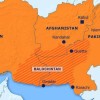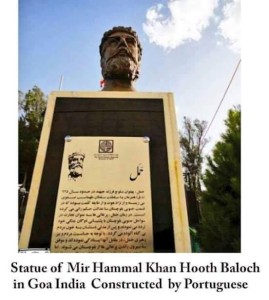Indian State Should Focus on Unconventional Methods: Jamal Nasir Baloch
INVINCIBLE BALOCH NATION; DESOLATE PAKISTAN AND IRAN

By Shahdad Baloch
Before 1839, the unjust demarcation of Balochistan in predominant three regions Balochistan in Iran, Pakistan, and Afghanistan, the Baloch land actual possession in term of geography is stretched up to 528975 square kilometers. The Baloch nation which shares a similar culture, norms, ethos, and folklores in all three parts of occupied Balochistan and it shares seashores of up to 1046 Kilometres which connects the Baloch land to the Arabian Sea, the Mediterranean Sea and the Indian Ocean. The total population of the Baloch nation is approximately 15.932 million comparatively. The France size country of Baloch people is enriched with natural resources and hydrocarbons.
Since the time of empires and imperialists, several expeditions were sent by different powers to conquer Balochistan and plunder her resources, but Baloch nation never compromised on their land and national interests – “fight, die and save Baloch motherland” has always been the manifesto of Baloch traditional and current political and military strategy. The concept of “Divide and rule”, excessive use of power and Sandman thought of empowering Nawabs and sardars and introducing a ‘Sardari System’ went in vain because of the Baloch struggle for freedom. When the British were left with no option, they drew artificial bourrides to weaken the Baloch nation, despite this, the artificial demarcations never left optimistic approach for the occupier to deter the Baloch from their freedom struggle.
Firdausi in his “Shahnama” called Baloch with following wordings, for their bravery and courage in 935-1025 as;
“Next after Gustaham came shrewd Askash endowed with prudent heart and ready brain, his troop was from the wanderers of the Koch and Baloch wearing exalted cocks comb crests very rams. o fight, no one had seen their backs in the battle or one of their fingers bare of armor, their banner was a part with claws projecting.”
In the 15th century, the Portuguese with their expansionist policies planned to proceed annexation of the coastal area of Makran Balochistan. The Portuguese attacked Makran under the leadership of Vasco de Gama but were repulsed by forces under the command of Mir Ismail. The Portuguese looted and set coastal villages on fire, but failed to capture the area of Makran. Cannons of the Portuguese army were found abandoned, lying near the central jail of Gwadar. Ismail’s grave is situated near the Mountain of Batail Gwadar, constructed by himself during his life time. He died in 1468.
 After Ismail’s regime, his nephew Mir Hammal (Hoth) Baloch, son of Jihand Khan(Hoth) Baloch, became the ruler of Makran. During his rule, the Portuguese initiated several attacks under the command of Lowess Dee Almia, but they were repelled each time, eventually agreeing to a truce wherein the Portuguese agreed not to attack the Makran coastal area. However, when Hammal was at sea with some companions, the Portuguese attacked his ship and took Hammal captive. History is evident that the king of Portuguese empire offered Hammal Hoth to marry his daughter because of Hammal’s bravery, it was a widespread concept at that time that marrying brave men, breeds brave generation for any empire or Royal family, but rather being part of a big empire Hammal Hoth preferred to die for his nation’s dignity and freedom against the intruder. A statue of Hammal resides in a museum on the island of Goa in India. The Portuguese constructed and erected it in his honor.
After Ismail’s regime, his nephew Mir Hammal (Hoth) Baloch, son of Jihand Khan(Hoth) Baloch, became the ruler of Makran. During his rule, the Portuguese initiated several attacks under the command of Lowess Dee Almia, but they were repelled each time, eventually agreeing to a truce wherein the Portuguese agreed not to attack the Makran coastal area. However, when Hammal was at sea with some companions, the Portuguese attacked his ship and took Hammal captive. History is evident that the king of Portuguese empire offered Hammal Hoth to marry his daughter because of Hammal’s bravery, it was a widespread concept at that time that marrying brave men, breeds brave generation for any empire or Royal family, but rather being part of a big empire Hammal Hoth preferred to die for his nation’s dignity and freedom against the intruder. A statue of Hammal resides in a museum on the island of Goa in India. The Portuguese constructed and erected it in his honor.
During this time, the Portuguese also attacked Tehs Bandar (western portion of Balochistan), which was under the command of Kareem Dad, who died in the attack along with 44 of his soldiers. The 15th century proved to be a harassment for Portuguese empire because of their humiliating defeat by the ideologically determined and Patriot Baloch.
The 19th and 20th centuries are remembered in the history of both Balochistan and Britain as, ‘Baloch consecutive war for the sovereignty of Balochistan’ which dates back to 1840,1880 and 1917 – the three Anglo-Marri wars. The location of these wars is north-eastern part of Balochistan, where Baloch rejected British loyalty against Balochistan’s sovereignty and freedom. Sardar Doda Khan Marri in and freedom fighters confronted Sir John Keane in 1840 CE, Brigadier-General Macgregor in 1880 CE, in first Anglo-Marri war the Marri Baloch won the battle against the British imperialism which is a part of the battle against Baloch in British history.
In 1880, second Anglo-Marri war, Marri tribesmen made frequent raids on the British. A force of 3070 British troops under Brigadier-General Macgregor marched through the country, a fierce battle went on for several months which ultimately ended with diplomatic efforts. During World War 1, the British forces were facing a shortage of recruits and started a campaign to enlist the Marri, who refused to join the British ranks. As a result, clashes broke out in large areas of the Marri land, under the leadership of General Mir Khuda e Dad Khan Marri, with both sides suffering hundreds of casualties. Ultimately Khuda e Dad Khan Marri embraced martyrdom with two of his younger brothers. In the end, the Marri tribe agreed to support Britain, despite this, they still refused to send their youth to join the war. This proves that Baloch nation in their history has never become a proxy for any other country or cause.
Today, Balochistan’s 347190 sq.km is under the occupation of Pakistan and approximately 181785 sq.km is occupied by Iran, where the population of Baloch on both sides is 15.935 million, that is facing harassment, brutality and being killed and dumped with new military strategy and changing terror tactics. Once again Pakistan and Iran are offering China to be their partner on the seashores of Balochistan, which is another tactic to engage Baloch nation with China – another would be memory of Portuguese and British imperialism because Pakistan and Iran are now tired and hopeless to confine and control Baloch struggle for freedom. Both countries have applied the policy of genocide of Baloch nation by force or by drugs, but their every effort is failed and obsolete before Baloch nation’s committed nature and willpower.
The agony is that in the standing scenario the world and global media are silent about the barbarism of Iran and Pakistan against Baloch nation. The desolate states of Pakistan and Iran are rampant in their conducts against Baloch nation, but despite this Baloch nation is invincible and fighting for the cause of freedom of Balochistan.
Today like the predecessors of classical Baloch leaders Mr. Hyrbyair Marri has successfully maintained the chain of thoughts of Baloch veterans who never let an inch of Baloch land to be occupied by any intruder, whether Iran, Pakistan or China. It is clearly evident in the history of the world that continuation of national interest’s policy leads to the success of a nation in the political arena of the world.
Likewise, the policies of Mr. Hyrbyair Marri have made the Baloch land invincible hitherto, the success of which can be judged on the basis that yet the world sees Balochistan as a divided land, worthy of solution. The Baloch nation under the leadership of Mr. Hyrbyair Marri is continuously gaining acknowledgment regarding the historical boundaries of Balochistan. The Free Balochistan Movement headed by Mr Marri demonstrated and represented the Baloch aspirations in their rallies and protests in USA, Canada, and Germany, Sweden, Norway, London and other European countries in which Baloch from eastern and western occupied Balochistan echoed their voices for freedom of Balochistan from Iran and Pakistan, where slogans of “China hands off Balochistan” were raised to show that the Baloch demand is clear which is freedom of Balochistan.
Today, the world should accept the reality that peace process in the Middle East and South Asia cannot be completed without the endorsement of Balochistan as a free state. Frequent ignorance of Baloch nation by global powers and rest of the civilized world has led the political scenario in such a phase that country like Pakistan and Iran are regulating terrorism as a tool of their foreign policies, while secular Baloch are pushed to the wall. The civilised world committed mistakes in the past that led to the division and occupation of Balochistan but now it is their responsibility to rectify those mistakes before the situation deteriorates. The ratification of such mistakes in only possible when the world starts pondering on freedom of Balochistan from Iran and Pakistan.









